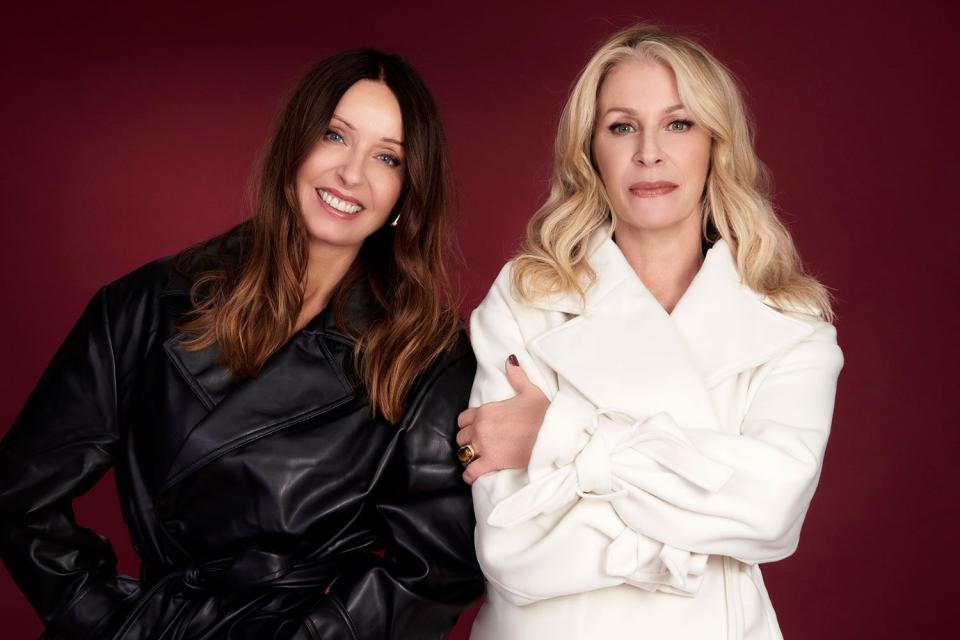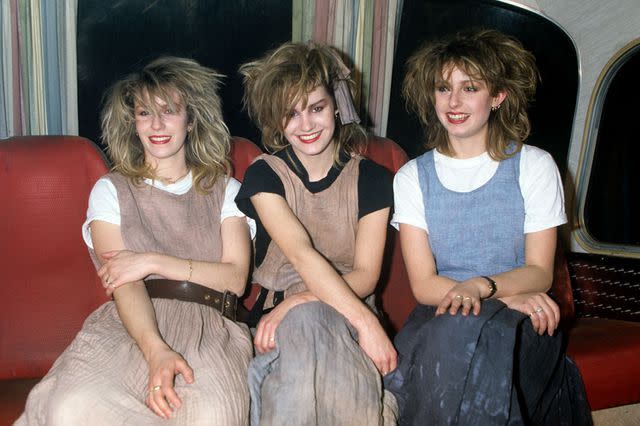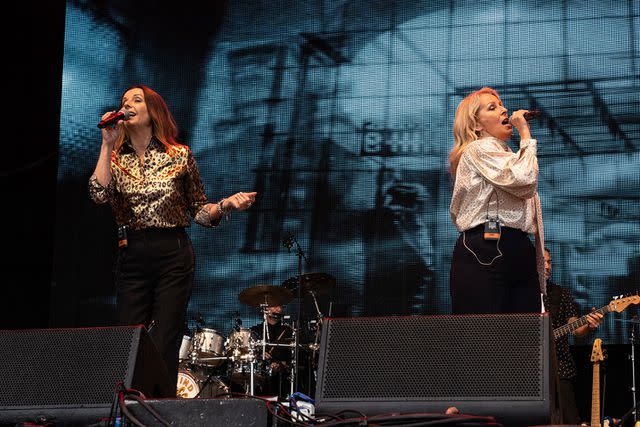Bananarama Talk Sisterhood and 40 Years of Music: 'We've Soldiered On' (Exclusive)
The British pop music duo of Keren Woodward and Sara Dallin just released 'Glorious,' a career-spanning hits collection

Alma Rosaz
Keren Woodward (l) and Sara Dallin (R) of BananaramaIn the career of the legendary British pop act Bananarama, the numbers speak for themselves: a staggering total of 30 charting songs in the U.K. That success translated over to the U.S., where they are best known for such singles as the No. 1 smash “Venus,” “I Heard a Rumour,” and the now-iconic “Cruel Summer.” More than 40 years after singers Keren Woodward and Sara Dallin and Siobhan Fahey formed the group in London, Bananarama are still performing on stages and making new music, with 2022’s Masquerade being their most recent studio album.
Last week, Bananarama – now fronted by Woodward and Dallin – released Glorious, a career-spanning compilation featuring their classic hits and new songs ahead of their upcoming shows at London’s Palladium venue in April.
“I think time flew by and we suddenly thought, ‘Wow, it's been four decades of making music,’” Dallin tells PEOPLE about their best-of collection. ”While there's always been from time to time our greatest hits, we just thought it would be nice to compile everything from the four decades and pick out some of our favorite tracks over the years.. It is just a celebration of our music, so it's a real moment for us.”
Never miss a story — sign up for PEOPLE's free daily newsletter to stay up-to-date on the best of what PEOPLE has to offer, from celebrity news to compelling human interest stories.
“To get to 40 years is something to really celebrate for both of us,” adds Woodward. “Not a lot of bands do. I know there are bands that have done 50 like the Stones, but not many bands can say they get to 40 years in the business.
The two singers, who have known each other since childhood, talk to PEOPLE about Glorious, Bananarama's hit-making success, and their friendship. This interview has been edited for length and clarity.
Both of you were involved in selecting the tracks. Was it like strolling down through memory lane?
Woodward: A couple of years ago we wrote an autobiography between the two of us, which was in the first lockdown. For me, it was really only putting pen to paper and going through it all that made me think, "That's not bad, that achievement." I think we are quite modest normally, and you sort of think, "Well, we've done so much and we've achieved so much from our beginnings to where we ended up." It's absolutely worth being proud of and celebrating and going through all the memories that we had. The music is all part of the memories that we have.
In addition to the big hits, Glorious features two energetic and uplifting electronic-oriented tracks “Feel the Love” and “Supernova.”
Dallin: I think you've hit the nail on the head there. We wrote about five or six tracks. We never know if we're going to do an album or an EP. Then it's like, "Should we put something out?" And then we had this project with London Records, so we thought, "OK, let's give them two tracks to go with it." And they are very positive. All the songs we wrote at that point were really uplifting.
Woodward: We've had our ups and downs as you do over a 40-year period, but the last few years have been so positive for us. We've always written songs that reflect where we are at that point or our lives. My favorite years in Bananarama have been the last few years, some of the stuff I'm most proud of — and the way we've developed as a live act and doing all the festivals and stuff. I feel we are fully in control and fully happy with where we are. And so the positive message comes out quite naturally.
Bananarama have always been associated with pop music and dance music, but it was drummer Paul Cook of the British punk rock band Sex Pistols who first discovered you.
Dallin: We were at school when punk happened, so it was great because you could see that everybody was just getting up and doing their thing rather than sort of training for years. It was very DIY. We'd met Paul in a club and he lived above. We moved in and above his rehearsal room, which was no longer the Pistols’, but they used to rehearse there. Because where we were living was closing down, we had to find somewhere to live. So we lived there rent-free for about six months, me and Keren.
Paul and Steve [Jones, also of Sex Pistols] called The Professionals, and Keren and I used to go and do backing vocals and I learned to play bass on [Clash member] Paul Simonon's bass. It was just fun messing around. Paul had a connection with someone from Mott the Hoople and we recorded in their studio and made the demo of "Aie a Mwana," so that's how it started. He was instrumental in helping us.
Unlike most of the previous female pop groups led by a male producer or manager, Bananarama wrote their own songs and steered the direction of their career.
Dallin: That just came naturally. It's like, "OK, let's write some songs." And we wrote them naïvely in the best way we could banging our hands on the tabletop because we didn't play instruments at that point, and we just recorded them on a Dictaphone. And it was all very DIY, very organic, very natural. We had nothing to go by. We didn't have any inspiration from other girl groups other than obviously '60s bands. But we were very different to that. We were sort of post-punk and a bit more weird-looking. You put your own clothes together because you didn't have money, so you just made your own style.

Fryderyk Gabowicz/picture alliance via Getty
Bananarama in 1983: (L-R) Sara Dallin, Siobhan Fahey and Keren WoodwardWoodward: We always did it our own way. Obviously when we first started, we had to learn and you are very reliant on a lot of other people to learn. But as we've gone through our careers, I think we just about covered every aspect of it. And we've managed ourselves for great big chunks of our career. The last two albums [In Stereo and Masquerade] we've released on our own label as well. We have a good team of people we've worked with on and off throughout the years who will always be there as the support network we need.
“Cruel Summer,” from the 1984 film The Karate Kid, was your breakout hit in the U.S. How did the song come about?
Dallin: Well, we worked with Steve Jolley and Tony Swain, and we loved their work with [the group] Imagination. They came up with a rough backing track and then we wrote the melody and the lyrics over the top. It was about our friends because we just sort of made it quite big at that point. We were on Top of the Pops, and so we're doing loads and loads of promo. We were used to going on our little annual holiday and then we couldn't go because we had so much promo. We were just moaning because all our friends were going on holiday and we couldn't, and the city is very oppressive in the heat in London and New York or wherever. So that was the kind of inspiration for it.”
Woodward: Yeah, 40 years of moaning is what we've done. It's like half-and-half: half laughing, half moaning.
Another classic Bananarama song is "Robert De Niro's Waiting." You actually met him after the single was released if that's correct?
Dallin: He was filming Brazil in London, and our PRs spoke to each other. Because I think the song was about to come out and they sent it to him and he just was intrigued. He called us up in our council flat, we were watching TV and my boyfriend answered the phone and said, “Bob De Niro's on the phone.” And we obviously just laughed and said, "As if.” We went to the phone after about five, 10 minutes and sure enough, there he was and he asked us out for a drink. We went to a private members club in Covent Garden called Zanzibar, and we had a drink with him and his producer and we had a fun night. But it was very surreal. It was one of the most classic moments of our lifetime. That and Mike Tyson singing “Cruel Summer” at us as we walked down the street in L.A., like, "How does he know our song?"
Bananarama scored their first U.S. No. 1 hit in 1986 with a cover of Shocking Blue’s “Venus.” This was a song that you had earlier performed live on stage and then wanted to record it?
Dallin: We kind of did it when we were rehearsing in Paul Cook's rehearsal room. We did “Really Saying Something,” “Venus,” and bizarrely "Aie a Mwana", which was sort of a 12-inch dance record I think Paul had. So eventually we heard this HI-NRG kind of sound, and we were always going to this place called Heaven, this huge club in [London's] Charing Cross Road. We just loved that music and we thought, “Why don't we do 'Venus' with a HI-NRG beat?” No one was overly keen on doing that, but the three of us stuck to our guns and it obviously speaks for itself. It was No. 1. That was great because when we were in Minneapolis – I think we were in Prince's club – there's a balcony at the top and they put “Venus” on. Everybody ran to the dance floor. That was quite something to see as well.
Fast forward to the present: the group’s most recent album is Masquerade from 2022, which also features songwriting by Sara’s daughter Alice (on such tracks as “Favourite” and “Forever Young”). It must have felt like a family affair.
Woodward: I am Alice's biggest fan and she's an exceptional songwriter. I think she writes the most incredibly heartfelt emotional lyrics and she sings amazingly.
Dallin: She just happened to be in my house one day and I was playing some backing tracks from our producer and we just started writing stuff and that's how it came about. And we were very much on the same level, even though we come from very different musical influences. It was very natural and really enjoyable.
Throughout the 40 years, Bananarama have soldiered on through different lineup changes (with former members Fahey and Jacquie O’Sullivan) and changing musical styles.
Woodward: “Soldiered on.” It's just perfect. Sometimes it really does feel like we've soldiered on.

by Lorne Thomson/Redferns
Keren Woodward and Sara Dallin of Bananarama perform during the 2022 Rewind Festival: Scotland at Scone Palace on July 24, 2022 in Perth, ScotlandWhat still accounts for the chemistry between the two of you still making new music and performing? It's a testament to your friendship.
Woodward: It is.
Dallin: We've always loved music from childhood. And we went to school together and we sang in choirs together. We made up songs together and kind of covered our favorite one, we covered when we were about, I don't know, 10 or11, was [Barbra Streisand’s] “Evergreen.”
Woodward: I recorded it on a cassette. My mother played it to everyone who came into the house.
Dallin: And we would work Saturday jobs when we were at school to get money. Then we put our money together and we bought Stevie Wonder’s Songs in the Key of Life and all the Roxy Music stuff. [We] like lyrics and melodies and the way it takes you on journeys. I just absolutely love writing songs. I don't really care what decade I get to. It's just an enjoyable and creative place to be. I'm glad we've been able to do this.
You are going to have a busy year with the release of Glorious, the three shows at the Palladium in London this April, and then other dates in the U.K. It begs the question: is there a chance you will play in the U.S.?
Woodward: We would love to. We haven't performed there since 2017, 2018. So it's about time.
Dallin: It'd be great if you had the festivals that we do over here [in Britain], because then there's a lot more people in it. It makes it more viable because it's quite hard to get a whole band together and start out [in the U.S.]. But we would love to play there. So anyone listening, let us know.
For more People news, make sure to sign up for our newsletter!
Read the original article on People.


